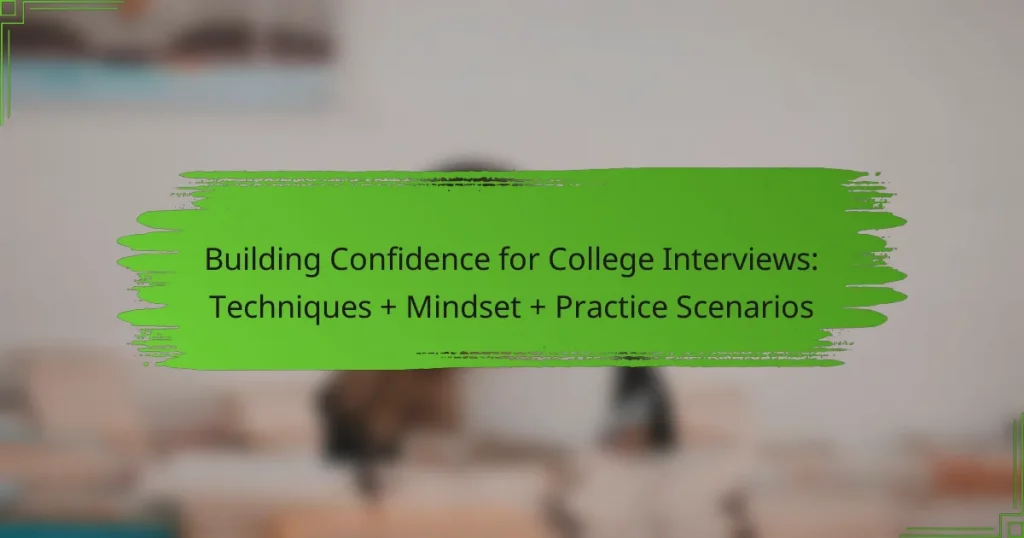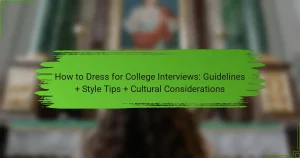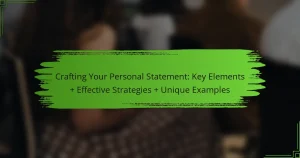
What are the key components of building confidence for college interviews?
The key components of building confidence for college interviews include preparation, practice, positive self-talk, body language, and familiarity with the interview format. Preparation involves researching the college and understanding the program. This knowledge helps in answering questions effectively. Practice through mock interviews can enhance comfort and reduce anxiety. Positive self-talk reinforces self-belief and mitigates negative thoughts. Body language plays a crucial role; maintaining eye contact and having an open posture can convey confidence. Lastly, being familiar with the interview format helps in anticipating questions and responses, increasing overall confidence.
How does mindset influence confidence during college interviews?
Mindset significantly influences confidence during college interviews. A positive mindset fosters a belief in one’s abilities. This belief can lead to reduced anxiety and improved performance. Research shows that individuals with a growth mindset perceive challenges as opportunities. This perspective enhances resilience and adaptability in stressful situations. Consequently, candidates are more likely to engage positively during interviews. Furthermore, a supportive mindset encourages preparation and practice, which are crucial for success. Studies indicate that prepared candidates exhibit higher confidence levels. Thus, mindset is a critical factor in shaping interview confidence.
What specific mindset shifts can enhance interview confidence?
Adopting a growth mindset can significantly enhance interview confidence. A growth mindset emphasizes the belief that abilities can improve with effort and learning. This perspective reduces fear of failure, allowing candidates to view interviews as opportunities for growth. Additionally, reframing negative thoughts into positive affirmations builds self-assurance. For instance, replacing “I might fail” with “I will learn from this experience” fosters resilience. Practicing self-compassion also helps in managing anxiety. Recognizing that everyone makes mistakes normalizes the interview process. Finally, visualizing success before the interview can create a positive mental state. Studies show that visualization techniques can improve performance by enhancing focus and reducing stress. These mindset shifts collectively empower candidates to approach interviews with greater confidence.
How can visualization techniques improve mindset for interviews?
Visualization techniques can significantly enhance mindset for interviews by fostering a positive mental state. These techniques involve mentally rehearsing the interview scenario, which can reduce anxiety. Research shows that visualization can improve performance by creating a sense of familiarity with the interview process. A study published in the Journal of Applied Psychology found that athletes who used visualization techniques improved their performance by 10%. Similarly, students preparing for interviews can benefit from this practice. By visualizing successful interactions, candidates can build confidence and reduce negative self-talk. This mental preparation helps in creating a calm and focused mindset during actual interviews.
What techniques can help build confidence before college interviews?
Practicing mock interviews can significantly build confidence before college interviews. Engaging in role-playing exercises allows candidates to become familiar with common questions. This preparation helps reduce anxiety and improves response quality. Research indicates that familiarity with the interview format can enhance performance. Additionally, positive visualization techniques can reinforce a confident mindset. Imagining successful interview scenarios can mentally prepare candidates for the actual event. Furthermore, thorough research on the college and its programs can boost confidence. Understanding the institution’s values and offerings allows candidates to tailor their responses effectively. Lastly, maintaining a positive self-talk routine can further enhance confidence levels. Affirmations can help counter negative thoughts and reinforce self-belief.
Which preparation strategies are most effective for interview confidence?
Effective preparation strategies for interview confidence include practicing mock interviews, researching the company, and preparing answers to common questions. Mock interviews help simulate the interview environment and reduce anxiety. Researching the company allows candidates to align their answers with the company’s values and culture. Preparing answers to common questions ensures candidates feel ready and reduces uncertainty. According to a study by the National Association of Colleges and Employers, candidates who practice interviews report feeling more confident and perform better.
How can mock interviews contribute to confidence building?
Mock interviews enhance confidence building by providing realistic practice scenarios. They simulate the actual interview environment, allowing individuals to experience potential questions and responses. This preparation reduces anxiety associated with real interviews. Participants receive immediate feedback on their performance, which helps identify areas for improvement. According to a study published in the Journal of Educational Psychology, practice through mock interviews significantly increases self-efficacy in interview settings. Engaging in multiple mock interviews can lead to improved verbal communication and body language, further boosting confidence. Overall, mock interviews serve as a valuable tool for developing interview skills and self-assurance.
What role does practice play in developing interview confidence?
Practice significantly enhances interview confidence. Engaging in repeated mock interviews helps individuals become familiar with common questions. This familiarity reduces anxiety during actual interviews. Practicing responses allows candidates to articulate thoughts clearly and concisely. Research indicates that individuals who practice report higher self-efficacy levels. A study by Bandura (1997) emphasizes that mastery experiences boost confidence. Regular practice builds a sense of preparedness and control. This preparation translates into a more confident demeanor during interviews.
How often should one practice for college interviews?
One should practice for college interviews at least two to three times a week. Regular practice helps to build confidence and improve responses. Engaging in mock interviews simulates real interview conditions. This frequency allows for gradual improvement in communication skills. Research shows that consistent practice enhances performance in high-pressure situations. According to a study by the National Association of Colleges and Employers, students who practiced frequently reported higher confidence levels. Therefore, practicing two to three times weekly is an effective strategy for success in college interviews.
What are some common practice scenarios for college interviews?
Common practice scenarios for college interviews include mock interviews with peers or mentors. These simulations help students practice their responses to typical interview questions. Another scenario involves recording oneself while answering questions. This allows for self-evaluation and improvement. Role-playing different interview situations can also be beneficial. It prepares students for various interview styles. Additionally, participating in group workshops can provide valuable feedback. This collaborative setting enhances confidence and communication skills. Engaging in these scenarios can significantly improve a student’s interview performance.
How can one effectively transition from preparation to actual interviews?
To effectively transition from preparation to actual interviews, one should practice mock interviews. Mock interviews simulate real interview conditions. This helps build familiarity with the interview format. Additionally, practicing answers to common questions enhances confidence. Reviewing feedback from mock interviews allows for improvement. Visualization techniques can also be beneficial. Visualizing success in the interview can reduce anxiety. Finally, arriving early on the interview day helps in settling nerves. Preparing in this manner increases the likelihood of a successful interview experience.
What are the common challenges faced when building confidence for interviews?
Common challenges faced when building confidence for interviews include anxiety, lack of preparation, and negative self-talk. Anxiety can manifest as nervousness or fear of judgment during the interview. Lack of preparation often leads to uncertainty about questions and responses. Negative self-talk can undermine self-esteem and create doubt in one’s abilities. Additionally, unfamiliarity with the interview format can contribute to insecurity. Research shows that these factors can significantly impact performance, as individuals who feel unprepared are less likely to present themselves effectively.
What practical tips can enhance confidence for college interviews?
To enhance confidence for college interviews, practice is essential. Engaging in mock interviews with peers can simulate the real experience. Research shows that preparation reduces anxiety; familiarizing yourself with common questions can boost readiness. Dressing appropriately also contributes to self-assurance; studies indicate that attire affects perceptions of professionalism. Additionally, positive visualization techniques can improve mindset; imagining successful outcomes fosters a confident attitude. Finally, deep breathing exercises before the interview can calm nerves, as physiological responses to stress can be managed through controlled breathing.
How can body language impact interview performance?
Body language significantly impacts interview performance. Non-verbal cues such as posture, eye contact, and gestures convey confidence and engagement. Research indicates that 55% of communication is non-verbal. Strong body language can create a positive impression. For instance, maintaining eye contact shows attentiveness and sincerity. Conversely, closed body language can suggest insecurity or disinterest. A study by Mehrabian (1971) highlights that body language influences how messages are perceived. Effective body language can enhance the overall message and increase the likelihood of a successful interview outcome.
What are the best ways to manage anxiety before an interview?
Practice deep breathing exercises to calm your nerves before an interview. Deep breathing lowers heart rate and reduces anxiety levels. Visualization techniques can also help. Imagine yourself succeeding in the interview. Preparation is crucial; research the company and role thoroughly. Familiarity with the material boosts confidence. Mock interviews provide practical experience. Practicing with friends or family can ease anxiety. Positive affirmations can change your mindset. Remind yourself of your strengths and past successes.
Building confidence for college interviews is essential for success, and this article outlines key components such as preparation, practice, positive self-talk, body language, and familiarity with interview formats. It emphasizes the influence of mindset, particularly the adoption of a growth mindset, on reducing anxiety and enhancing performance. Techniques like visualization and mock interviews are highlighted as effective strategies to build confidence and improve interview readiness. Additionally, the article addresses common challenges faced during the preparation process and offers practical tips to manage anxiety and enhance overall interview performance.




